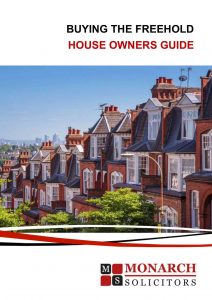The freehold purchase, or enfranchisement, of a house if a much more straightforward process. You don’t have to concern yourself with other leaseholders potentially messing up your plans. It is advisable in this scenario to start with a professional valuation and seek the advice of a solicitor.
The buy the freehold of a flat is a little more complicated, as there are numerous leaseholders involved. Here are top 10 tips to consider when thinking about buying your freehold:
Step 1 – Check that you are eligible
Not all leaseholds will be eligible to buy the freehold. Check the leaseholds that are eligible to buy the freehold and check that your lease does not fall under an exception. You will also need to make sure all the other leaseholders joining your claim have eligible leaseholds. Check to see if your leasehold is eligible.
Step 2 – Get your neighbours involved
To buy the freehold in a block of flats you need to get your neighbours involved. At least half of the leaseholders need to be involved in order to buy the freehold. It might be a good idea to do your research first and then go to the other leaseholders with a plan. Find out how much it will cost each leaseholder individually and look at how much they will save. Think about going through step 3 and 4 before you approach your neighbours. It may also be a good idea to look for financing options in step 5 at this stage to present to leaseholders that may not have enough in savings to cover their portion of the freehold.
Step 3 – Consider all your costs
Buying a freehold is not as simple as just paying the purchase price. There are other fees that need to be considered. These can include the price of a valuation of the property and the solicitor’s fees. You also need to pay for the reasonable fees of the freeholder. This is usually capped at £3000. The purchase price and these fees will be split evenly amongst your fellow buyers.
Step 4 – Estimate the value of the property
This can be difficult to estimate without a professional valuation. To get a rough estimate you could check out a lease extension calculator. The cost of buying the freehold should be roughly the same as it would to extend your lease. This is a good place to start if you want a rough idea of the costs involved to present to your neighbours. It should always be stressed though that this is a rough estimate as the price of freeholds vary. An accurate valuation of the property can only be made by a property surveyor.
Step 5 – Think about financing options
Talking to your mortgage lender is always the first option. Most will be happy to extend your mortgage to allow you to buy the freehold. Having this conversation early on is important to figure out if it is worth continuing. Even if you are only working from estimates its still a good idea to talk through your options with your mortgage provider. Alternatively, some services provide impartial financial advice that may be able to help you consider your options.
Download our Free Freehold Purchase Guide
Step 6 – Talk to a solicitor
Now that you have figured out if you can afford the freehold based on estimates it is important to start getting professional advice. Make sure you research the solicitor you are dealing with to see if they have experience dealing with freehold purchase. At Monarch Solicitors we have solicitors with a depth of experience in this area, for more information on our services please visit.
Step 7 – Participation agreement
The first step your solicitor should take is drawing up a participation agreement between all the leaseholders taking part. The participation agreement is a contract between all the leaseholders taking part outlining all matters and obligations of each leaseholder relating to the purchase. It makes sure no participant can drop out at the last minute.
Step 8 – Professional valuation of the property
Now that all the leaseholders are committed, and your solicitor has advised you that your eligible to proceed you need to find out the value of the property. Your solicitor will be able advice you of a suitable professional survey who can help you get a valuation of the property. The valuation is essential for you to understand the value of the property and put in a sensible offer to the freeholder.
Step 9 – Set up a ‘company’
A company can either be the leaseholders personally setting up their own company or a management company they appoint to manage the building. Alternatively, you can appoint a nominee purchaser to act on behalf of the other purchasers. Talk to your solicitor to discuss which option is the best way for you.
Step 10 – Issue a tenant’s notice
The tenants notice is executed by your solicitor and signed by all the leaseholders involved in the purchase. The notice formally requests the purchase of the freehold. Within 2 months your landlord will then issue a notice in reply. In the notice your landlord either agrees to the sale or provides reasons why he does not agree. Once you have the agreement from your landlord negotiations on price can begin.














